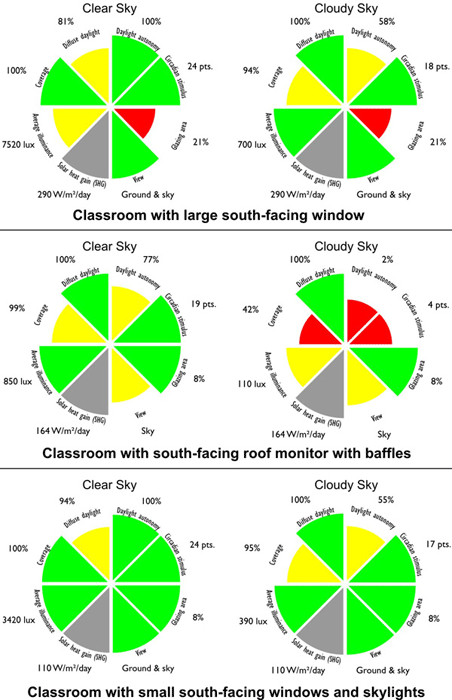Researchers at the Lighting Research Center at Rensselaer Polytechnic Institute have proposed a new metric to help architects and builders more easily take advantage of the benefits of daylighting, from significant energy savings to the positive impact of light on health, when designing the built environment. This new metric—the daylighting dashboard—provides an early indication of a design’s potential to meet eight design goals that contribute to the successful use of daylighting.
The proposed metrics were recently published in a paper titled, “Conceptual Design Metrics for Daylighting” in the journal Lighting Research & Technology. The project was led by Russ Leslie, associate director and professor at the Lighting Research Center, along with Leora Radetsky, lead research specialist; Mariana Figueiro, professor and Light and Health program director; Aaron Smith, former research specialist; and Lisa Yue, former graduate student. The project was sponsored by the United States Green Building Council (USGBC).
The development of daylighting metrics has been the subject of considerable effort and debate, but no widely accepted metric has emerged to help recognize well-daylit buildings. Although simulation software exists to assist designers in daylight analysis, these programs are often overly complex and involve a high level of expertise. On the other hand, rule-of-thumb approaches that are often used to aid in the decision-making process are based on overly simplified assumptions.
Leslie and colleagues proposed the daylighting dashboard, a visual representation of a design’s potential to meet eight design goals: average illuminance, coverage, diffuse daylight, daylight autonomy, circadian stimulus, glazing area, view, and solar heat gain. “We propose eight minimum components and a simple way to estimate performance at the very beginning of building design,” said Leslie. “The daylighting dashboard allows for flexibility in precision, calculation software, or bracketing values for the eight goals, which can be prioritized in the context of individual projects, rating systems, or code requirements.” The daylighting dashboard is also the first integrative approach that includes a validated circadian stimulus model, taking into consideration photobiological benefits of daylighting, such as daytime alertness and more restful sleep at night.
This new metric provides an indication of performance and weaknesses of conceptual designs early in the design phase, while there is still an opportunity to make modifications. An architect facing one or more red flags during conceptual design could give further consideration to these issues or enlist appropriate daylight expertise. This early indication of performance of conceptual design alternatives is likely to guide architects toward better daylit buildings.
The image below exemplifies the use of the daylighting dashboard to compare three different classroom designs in their ability to meet the eight design goals.

About the Lighting Research Center
The Lighting Research Center (LRC) is part of Rensselaer Polytechnic Institute of Troy, N.Y., and is the leading university-based research center devoted to lighting. The LRC offers the world's premier graduate education in lighting, including one- and two-year master's programs and a Ph.D. program. Since 1988 the LRC has built an international reputation as a reliable source for objective information about lighting technologies, applications, and products. The LRC also provides training programs for government agencies, utilities, contractors, lighting designers, and other lighting professionals. Visit www.lrc.rpi.edu.
About Rensselaer Polytechnic Institute
Rensselaer Polytechnic Institute, founded in 1824, is the nation's oldest technological university. The university offers bachelor's, master's, and doctoral degrees in engineering, the sciences, information technology, architecture, management, and the humanities and social sciences. Institute programs serve undergraduates, graduate students, and working professionals around the world. Rensselaer faculty are known for pre-eminence in research conducted in a wide range of fields, with particular emphasis in biotechnology, nanotechnology, information technology, and the media arts and technology. The Institute is well known for its success in the transfer of technology from the laboratory to the marketplace so that new discoveries and inventions benefit human life, protect the environment, and strengthen economic development. |